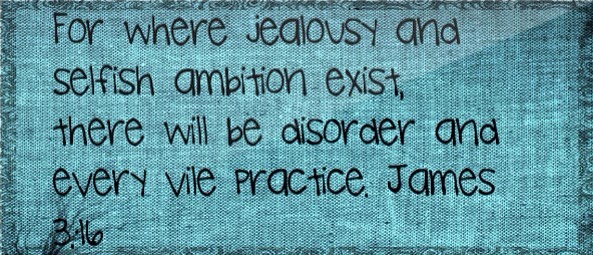James 3:14-16 ESV But if you have bitter jealousy and
selfish ambition in your hearts, do not boast and be false to the truth. This
is not the wisdom that comes down from above, but is earthly, unspiritual,
demonic. For where jealousy and selfish ambition exist, there will be disorder
and every vile practice.
Philippians 2:3-4 ESV Do nothing from rivalry or conceit, but in
humility count others more significant than yourselves. Let each of you look
not only to his own interests, but also to the interests of others.
Proverbs 18:1 ESV Whoever isolates himself seeks his own
desire; he breaks out against all sound judgment.
James 2:14-17 ESV What good is it, my brothers, if someone
says he has faith but does not have works? Can that faith save him? If a
brother or sister is poorly clothed and lacking in daily food, and one of you
says to them, “Go in peace, be warmed and filled,” without giving them the
things needed for the body, what good is that? So also faith by itself, if it
does not have works, is dead.
Self-centeredness is defined as “excessive concern with
one’s own interests and well-being; self-love or egotism.” The Bible tells us
“people who are self-centered aren’t able to please God” (Romans 8:8).
Self-centeredness is a sin because it leads to being devoted to
self-gratification and overlooking other people’s needs (Romans 2:8;James 3:16).
Self-centeredness and self-love are totally adverse to the teachings of
Scripture (1 Corinthians 13:4–7).
“When we're
self-centered, the sinful passions aroused through the law are at work in all
the parts of our body, so that we bear fruit for death” (Romans 7:5). The NIV
translates “self-centered” as “in the realm of the flesh.” By being
self-centered or giving in to our sinful, fleshly natures, we are bearing fruit
that results in death. It is ironic that putting oneself first leads to our
destruction (Luke 17:33).
Jesus goes to the very core of the sin of self-centeredness
with this clear declaration: “Whoever wants to be my disciple must deny
themselves and take up their cross and follow me” (Matthew 16:24). To deny
oneself means letting go the material things used to gratify and define self.
To deny oneself is to let go of selfish desires and earthly security and focus
instead on the interests of God (Matthew 6:33). The mindset of “the one with
the most toys wins!” is seen for the fallacy it is. Denying oneself turns us
from self-centeredness to God-centeredness. Self is no longer in charge; God
is. Christ rules our hearts.




No comments:
Post a Comment